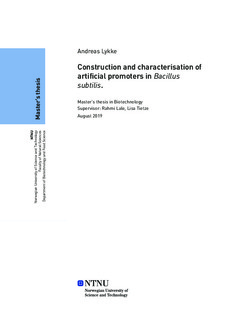Construction and characterisation of artificial promoters in Bacillus subtilis.
Master thesis
Permanent lenke
http://hdl.handle.net/11250/2621729Utgivelsesdato
2019Metadata
Vis full innførselSamlinger
Sammendrag
Bacillus subtilis en en gram-positiv modellorganisme. Den er mye brukt i både forskning og industri.B. subtilis regnes som en av de viktigste bakteriene for industrien, på grunn av effektivt uttrykk og sekresjon av proteiner. På tross av den viktige rollen B. subtilis har i industri og forskning er det få nøye beskrevne promotorer tilgjengelig. En effektiv og lett gjennomførbar metode for å lage kunstige B. subtilis-promotorer kan derfor ha implikasjoner for bioteknologisk industri, og det kan lede til at nye og potensielt viktige promoterer kan oppdages og brukes i forskning. I denne masteroppgaven blir en ny metode kalt Gene Expression Engineering (GeneEE) metoden brukt til å lage kunstige B. subtilis promotorer. GeneEE metoden basererer seg på bruken av en DNA-sekvens med tilfeldig DNA-innhold av en viss lengde. Denne sekvensen settes inn i promotorregionen til et gen som har fått sin naturlige promotor fjernet. I denne masteroppgaven ble tre forskjellige typer tilfeldig DNA brukt: 200N, som består av 200 tilfeldige nukleotid basepar, 50N, som består av 50 tilfeldige nukleotid basepar, og 200NSD, som består av 211 tilfeldige nukleotid basepar med en Shine-Dalgarno sekvens, GGAG. Det forventes at B. subtilis trenger Shine-Dalgarno sekvensen for translasjon. I denne masteroppgaven beskrives for første gang GeneEE-metoden i B. subtilis. Oppgaven beskriver konstruksjonen, identifikasjonen og in vivo og in silico beskrivelser av 21 B. subtilis promotorer. Promotorsekvensene ble, ved hjelp av flere online verktøy, analysert, og kjente promototermotiver ble identifisert, inkludert −10 og −35 elementer fra σ 70 . Det ble vist en viss sammenheng mellom prøvene som utrykte sterkt, og match til konsensussekvenser fra kjente elementer. Et unntak var 50N-prøvene, som ikke matchet konsensus, men allikevel viste tegn til genuttrykk, dog med en del variasjon i dataene. Det ble bevist at GeneEE-metoden er kapabel til å produsere nye, tidligere ukjente, funksjonable promotorer i B. subtilis. Bacillus subtilis is a gram-positive model organism used in both academic research and industrial applications. Due to its efficient protein expression and secretion capacity it is widely considered to be one of the most important bacterium for the industrial production of bio-products.Despite its importance in academic research and industry, there are few well-characterised promoters available.An efficient and easy to use way of creating artificial promoters for B. subtilis could therefore have implications for the biotechnology industry, as well as leading to the discovery and availability of many new promoters, benefiting research science.
In this master’s thesis, a novel method, Gene Expression Engineering (GeneEE), has been used for generating artificial promoters in B. subtilis. The GeneEE method relies on the insertion of stretches of DNA with random DNA composition into the promoter regions of genes, after removal of the native promoter.
In this thesis three different random DNA inserts were used: 200N, consisting of 200 nucleotides (nt) random DNA base pairs; 50N, consisting of 50 nt random DNA base pairs; and 200N-SD, consisting of 211 nt random DNA base pairs harbouring a Shine-Dalgarno sequence, GGAG, which is thought to be necessary for translation in B. subtilis.
This thesis contains the first published description of the GeneEE-method in B. subtilis. In the thesis, the construction, identification and in vivo and in silico characterisation of 21 promoters in B. subtilis is reported.The sequences were, using several online tools, analyzed and known promoter motifs were identified, including σ70 −10 and −35 elements. The samples that displayed the higher fluorescence generally also had a closer consensus match to known elements, with the exception of the 50N samples, which did not match the expected consensus, but also had more variation in the measured relative fluorescence data.
The method was proven effective in creating functional promoters for B. subtilis, with the promoters not matching previously published promoter sequences.
